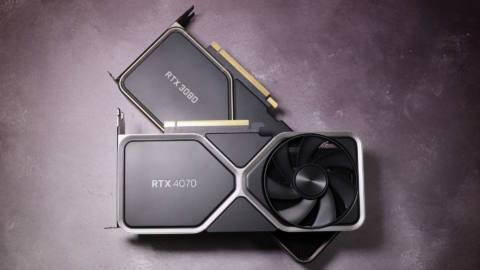The US Department of Justice is investigating whether Nvidia is playing fair with its AI chips. Subpoenas have reportedly been sent out to Nvidia and other companies to uncover whether customers who buy AI hardware from alternative suppliers are being penalised.
According to business news outlet Bloomberg, DoJ officials had previously sent questionnaires to both Nvidia and its customers. But now it has escalated its investigations to legally binding subpoenas, a move which Bloomberg says is a critical step on the path toward the DoJ taking formal action against Nvidia.
The report doesn't go into any detail regarding exactly how Nvidia might be “punishing” its customers for going to alternative suppliers for AI chips. But Nvidia has such a stranglehold on the market for GPUs used to accelerate AI training and inferencing, that it's not hard to imagine how, for instance, withholding supply or ramping up prices would get very painful, very quickly for customers.
The DoJ is concerned that Nvidia's practices are making it harder for customers to switch suppliers, which in turn undermines competition in the market. In response, Nvidia told Bloomberg that, “Nvidia wins on merit, as reflected in our benchmark results and value to customers, who can choose whatever solution is best for them.”
Incredibly, Bloomberg also reports that such is the demand for Nvidia's H100 AI chips, they have been selling for as much as $90,000 a pop, which does rather put the $1,600 MSRP of the RTX 4090 into context. The net result is absolutely massive revenues for Nvidia, with a forecast of $120 billion for 2024. That compares to revenues of just $16 billion as recently as 2020.
However, the shine has slightly come off Nvidia and its AI mastery of late. Its share price has been on the slide in recent weeks, falling from a peak of $130 on August 19 to $108 today. Indeed, the company's market cap fell by $279 billion on Tuesday this week alone.
Those adjustments have come as the hype around AI has cooled somewhat. For now, it's not clear how the latest AI models can be turned into revenue streams. Meanwhile, competitors in the AI hardware space including AMD are finally rumbling into action. Nvidia's near-monopoly probably won't last forever, in other words.

Best CPU for gaming: The top chips from Intel and AMD.
Best gaming motherboard: The right boards.
Best graphics card: Your perfect pixel-pusher awaits.
Best SSD for gaming: Get into the game ahead of the rest.
That final observation is presumably why Nvidia would get involved in the kind of sharp practices the DoJ is worried about. Of course, this kind of behaviour is hardly new to the tech sector.
For instance, Intel has been subject to numerous antitrust investigations over the years, both in the US and EU. So, it's somewhat par for the course for powerful incumbents to get hooked on market dominance and the fat revenues they imply.
Whether Nvidia is guilty of such practices is something that will presumably emerge over the course of this latest DoJ probe. Meanwhile, what impact any of this might have on what we really care about, namely painful GPU prices for gamers, is anyone's guess.






